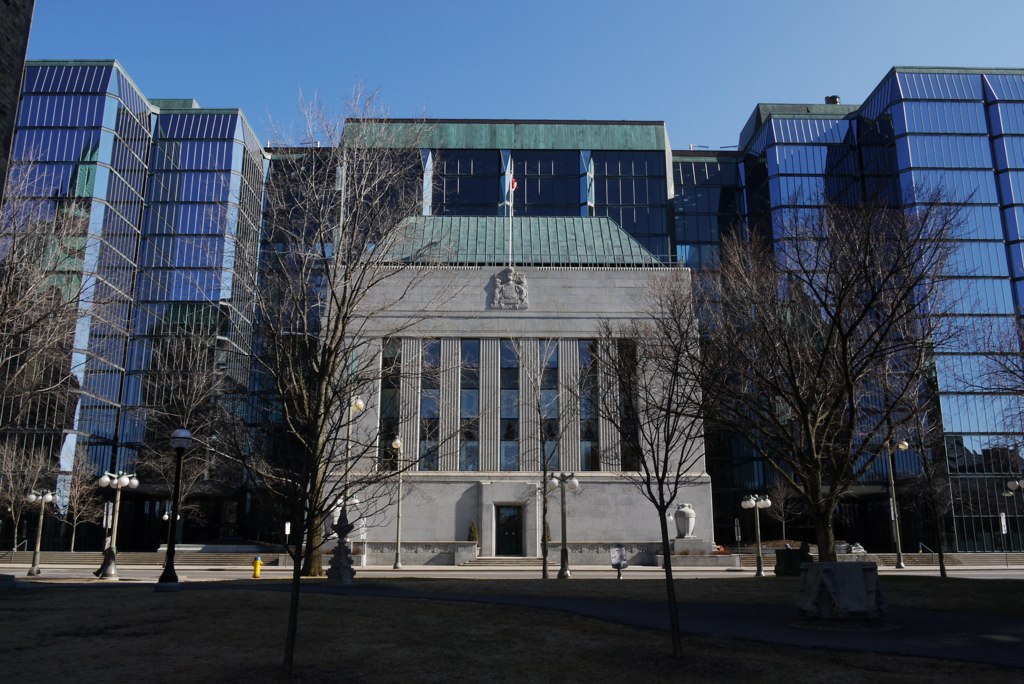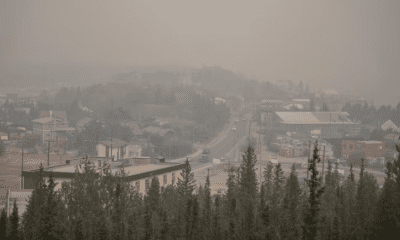Canada News
Timing of Bank of Canada’s next statement gives it potential to tinge election

FILE: Bank of Canada building in Ottawa (Photo By d.neuman from Ottawa, Canada – Bank of CanadaUploaded by Skeezix1000, CC BY-SA 2.0)
OTTAWA — Canadians last heard the Bank of Canada’s take on the economy in the early days of summer — and the timing of its next update has the potential to tinge political debate during the federal election campaign.
Since the bank’s most recent public comments in early July, there’s mounting evidence of a slowing global economy mostly due to the escalating U.S.-China trade war — including a fresh exchange Friday of tariff threats between the two economic giants that shook up markets.
The Bank of Canada’s latest message underlined the resilience of the domestic economy, and it appeared in no rush to move its policy even as other central banks were poised to lower rates to respond to the already dimming international outlook.
The next policy meeting is scheduled for Sept. 4, while the election campaign is widely expected to start at some point during the first two weeks of September. The central bank will release a statement with its rate decision, and the following day deputy governor Lawrence Schembri will provide more detail about the governing council’s thinking when he gives a speech and holds a news conference in Halifax.
Scotiabank chief economist Jean-Francois Perrault predicts the Bank of Canada will take out insurance against potential damage by cutting rates this fall — and perhaps as early as Sept. 4 — because external risks have intensified since July.
Perrault said a rate reduction at the start of the election campaign, or even messaging that sends the impression the bank is tilting towards the possibility of a cut, could force political parties on the campaign trail to adjust their messages on fiscal policy.
“What I think it could do is trigger a bit of conversation around: how would we react if things get worse?” said Perrault, a former assistant deputy minister under Finance Minister Bill Morneau.
It will be difficult for party leaders, of course, to lay blame on each other for the global economic risks, which are a result of the U.S.-China trade conflict, he added.
The threat of deepening global trade conflicts was a central concern for the Bank of Canada in July. With no signs of peace between the U.S. and China, that dispute will likely be prominent in its upcoming commentary.
On Friday, Trump responded to China’s latest tariffs on American goods with an eyebrow-raising string of tweets, including: “Our great American companies are hereby ordered to immediately start looking for an alternative to China, including bringing … your companies HOME and making your products in the USA.”
Later in the day, Trump said that he planned to raise the value of existing tariffs, starting Oct. 1, and incoming tariffs, beginning Sept. 1, on hundreds of billions of dollars of Chinese goods.
“China should not have put new Tariffs on 75 BILLION DOLLARS of United States product (politically motivated!),” the president tweeted.
Kathy Brock, a Queen’s University political science professor, said voters could become more apprehensive about their future if there are signs of a slowdown or if the U.S. takes action that ripples into the Canadian economy.
She said it could affect the election results as some voters look to parties promising more spending restraint, while others become drawn to leaders pledging more support.
Brock said the average voter, when considering the campaign vows, will be thinking: “What does this mean for me and my family, what can I afford and not afford and who’s going to protect us from what happens the most?”
Former parliamentary budget officer Kevin Page said Canada appears to be well-positioned to handle an economic downturn because it’s projecting “modest” government deficits below one per cent of gross domestic product.
But he expects party leaders will be challenged to lay out how far they’d be willing to go to shore up the economy, if necessary.
Page stressed that the issue should have been a bigger part of the political debate ahead of the 2008 federal vote, which took place during the global financial crisis and, eventually, the Great Recession.
“I think it is a fair question in policy debates and an issue for party platforms as to how the different political parties would handle a potential downturn,” Page, who heads the Institute of Fiscal Studies and Democracy think tank at the University of Ottawa, wrote in an email.
Canadians, he added, should ask if the parties are willing to use fiscal stimulus — including how much, in what form and for how long?
“Given that most provinces are not fiscally sustainable, would the federal government lead the way with fiscal stimulus?”
Other central banks — including the U.S. Federal Reserve — have cut their interest rates or signalled that easing is on the way. Markets expect the Fed to lower U.S. rates again this year.
In a speech Friday an annual policy conference in Jackson Hole, Wyo., Fed chairman Jerome Powell said: “we will act as appropriate to sustain the expansion.”
Bank of Canada governor Stephen Poloz also attended the meetings this week in Wyoming with his global peers. The Bank of Canada’s subsequent rate announcement is scheduled for Oct. 30, after the federal election.





















